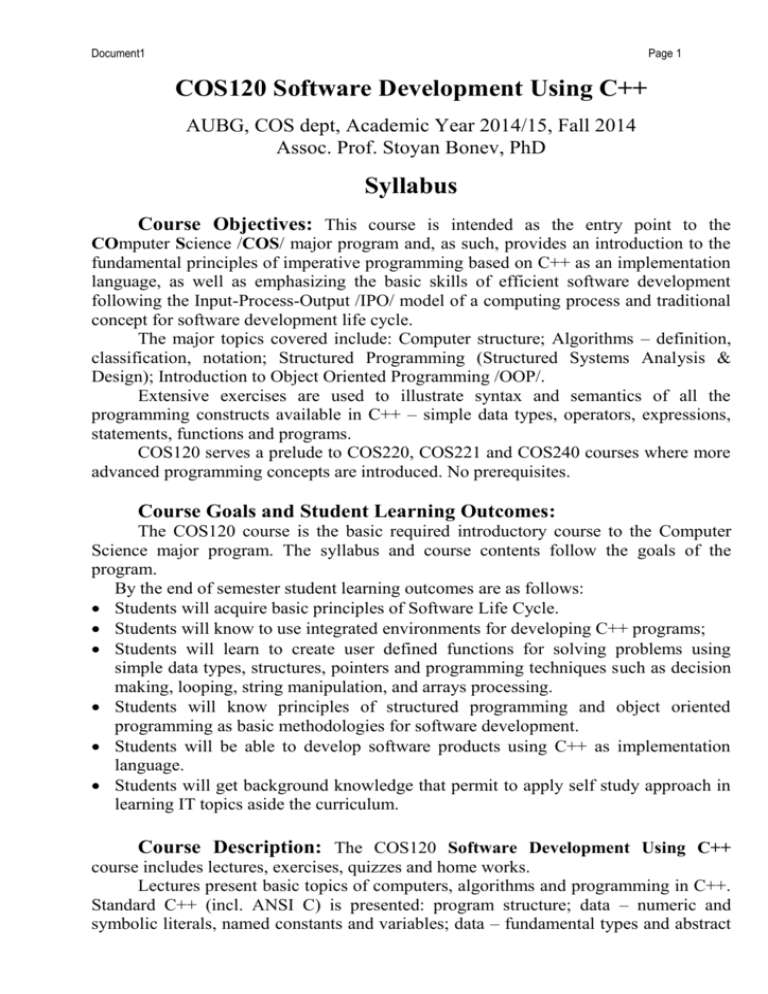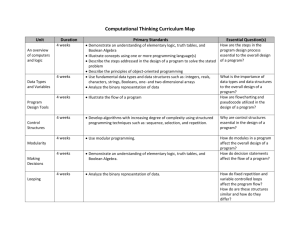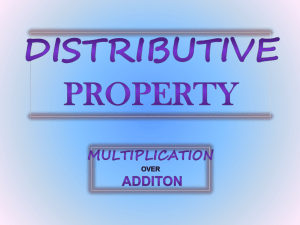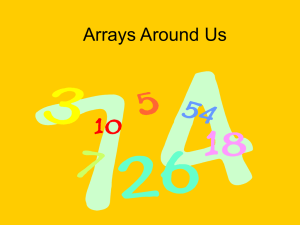
Document1
Page 1
COS120 Software Development Using C++
AUBG, COS dept, Academic Year 2014/15, Fall 2014
Assoc. Prof. Stoyan Bonev, PhD
Syllabus
Course Objectives: This course is intended as the entry point to the
COmputer Science /COS/ major program and, as such, provides an introduction to the
fundamental principles of imperative programming based on C++ as an implementation
language, as well as emphasizing the basic skills of efficient software development
following the Input-Process-Output /IPO/ model of a computing process and traditional
concept for software development life cycle.
The major topics covered include: Computer structure; Algorithms – definition,
classification, notation; Structured Programming (Structured Systems Analysis &
Design); Introduction to Object Oriented Programming /OOP/.
Extensive exercises are used to illustrate syntax and semantics of all the
programming constructs available in C++ – simple data types, operators, expressions,
statements, functions and programs.
COS120 serves a prelude to COS220, COS221 and COS240 courses where more
advanced programming concepts are introduced. No prerequisites.
Course Goals and Student Learning Outcomes:
The COS120 course is the basic required introductory course to the Computer
Science major program. The syllabus and course contents follow the goals of the
program.
By the end of semester student learning outcomes are as follows:
Students will acquire basic principles of Software Life Cycle.
Students will know to use integrated environments for developing C++ programs;
Students will learn to create user defined functions for solving problems using
simple data types, structures, pointers and programming techniques such as decision
making, looping, string manipulation, and arrays processing.
Students will know principles of structured programming and object oriented
programming as basic methodologies for software development.
Students will be able to develop software products using C++ as implementation
language.
Students will get background knowledge that permit to apply self study approach in
learning IT topics aside the curriculum.
Course Description: The COS120 Software Development Using C++
course includes lectures, exercises, quizzes and home works.
Lectures present basic topics of computers, algorithms and programming in C++.
Standard C++ (incl. ANSI C) is presented: program structure; data – numeric and
symbolic literals, named constants and variables; data – fundamental types and abstract
Document1
Page 2
types; expressions as composed of operands and operators; statements; functions –
prototype, call, definition, parameter passing mechanisms; standard Input/Output and
file Input/Output. Source texts of various programs oriented to concrete problem
solving illustrate the topics covered.
Exercises contain discussion on source texts of demo programs and tasks to be
individually solved (designed as an algorithm and implemented to an executable
program) by the student.
Quizzes are short 15-30 min sessions and intend to train students’ skills in
understanding specific C++ syntax constructs.
Homework assignments are given at the end of a lecture. They are to be delivered
to the lecturer with printed listing and output before fixed deadline. Sessions to
demonstrate running home works take place in week 10 and week 14.
Detailed Course Description:
List of Lectures
Lecture
Lecture 1
Lecture 2
Lecture 3
Lecture 4
Lecture 5
Lecture 6
Lecture 7
Lecture 8
Basic Topic
Introduction to Computers, Problem Solving and Programming.
Computer hardware. Computer software. The software development
method. Algorithms – definition and classification. Flowcharts as a tool for
algorithm description.
Computers, Problem Solving and Programming (continued).
Applying the software development method. Introduction to linear
algorithms and branch algorithms. Typical examples.
Computers, Problem Solving and Programming (continued).
Applying the software development method. Exercises on linear and
branch algorithms. Introduction to loop algorithms. Typical examples.
Computer Languages.
Processing a C++ program (edit, compile, link and run).
The C++ programming language – a tutorial introduction.
Computer Languages. (continued).
Programming Environments. Integrated Development Environments MS
Visual Studio, Code Blocks. The project/solution concept. Console
applications. Sample C++ programs.
Computer Languages (continued).
The C++ programming language elements. Structure of a C++ program.
Top-Down Design with Functions.
Step-wise refinement and structure charts. Functions topics: prototype,
call and definition. Functions without arguments.
Top-Down Design with Functions (continued).
Functions with an input argument. The return statement. Functions
returning a single result. Mathematical built-in library functions.
Document1
Lecture 9
Lecture 10
Lecture 11
Lecture 12
Lecture 13
Lecture 14
Lecture 15
Lecture 16
Lecture 17
Lecture 18
Lecture 19
Lecture 21
Lecture 22
Lecture 23
Lecture 25
Lecture 26
Page 3
Functions and Program Structure.
Basics of functions. System predefined and user defined functions.
General form of a function definition. The minimal C++ function.
Functions with multiple arguments.
Control Flow. Selection (decision) structures.
The if, if-else control statements. Nested if statements. Demo
programs illustrations.
Control Flow. Selection (decision) structures (continued).
Conditions – expressions including arithmetic, relational, equality and
logical operators. The switch control statement.
Control Flow. Repetition (loop) structures.
The while, for and do … while control statements.
Control Flow. Repetition (loop) structures (continued).
Logical and functional classification of loop (iterative) algorithms.
Control Flow. (continued).
The break, continue, goto statements. Nested loops. Design
and implementation of programs using linear, branch and loop algorithms.
Control Flow. (continued).
Nested do-loops. Design and implementation of programs.
Modular Programming.
Functions with simple output parameters. Formal output parameters as
actual arguments.
Modular Programming (continued).
Debugging and errors: syntax, run-time, undetected and logic errors;
A program with multiple functions. Home works presentation.
Functions and Recursion.
The nature of recursion. Recursive mathematical functions. Program
implementation of the Hanoi towers game.
Simple Data Types.
Representation and conversion of numeric types. Representation and
conversion of type char. Enumerated data types.
Arrays.
Declaring and referencing arrays. Array subscripts. Using for loops for
sequential access.
Arrays (continued).
Searching in array: linear and binary search. Multidimensional arrays.
Strings.
Library functions. Assignment and substrings. Concatenation.
Comparison.
Pointers.
Pointers and addresses. Pointers and function arguments. Pointers and
arrays. Pointer arrays.
Structures.
Document1
Lecture 27
Lecture
28a
Lecture
28b
Lecture
28c
Page 4
Basics of structures. Structure type definition (typedef statement).
Structures and functions. Structures as input parameters and return values.
Arrays of structures. Pointers to structures.
File Input/Output Processing.
Input/output files. Text mode files and binary mode files. File access.
Standard input/output streams.
From C to C++.
C++ as a superset of C. Stream oriented Input/Output. Scope resolution
operator. Reference data type. Overloaded functions. Default Arguments
Functions.
From C to C++.
Classes and objects. Introduction to Object Oriented Programming /OOP/.
Back from C++ to C.
C as a subset of C++. List of C++ syntax constructs not supported in C.
List of Quizzes
Quiz 1
Quiz 3
Quiz 5
Algorithms & Elementary C++
Selections and Loops
Pointers and Strings
Quiz 2
Quiz 4
Quiz 6
Skills in C++ functions
Arrays
Structures and OOP
Hwk 2
Hwk 4
Hwk 6
Skills in C++ functions
Arrays/Recursive functions
Structures and OOP
List of Home Works
Hwk 1
Hwk 3
Hwk 5
Elementary C++
Selections and Loops
Pointers and Strings
References /Recommended textbooks/:
1. Friedman F.L., Koffman E.B., Problem Solving, Abstraction and Design Using C++,
Pearson, Addison-Wesley, 6e, 2010.
2. Y. Daniel Liang, Introduction to Programming with C++, Pearson IE, 3e, 2014.
3. Cay S. Horstmann, C++ for Everyone, John Wiley & Sons, 2e, 2012.
4. Kernighan B.W., Ritchie D.M., The C Programming Language, Prentice-Hall, Inc.,
Englewood Cliffs, N.J., 1988.
References /Other useful books/:
1. Any book on C/C++ available in the AUBG library.
Grading: Final exam:
30%
Midterm exam:
18%
Home works: 6x3%
18%
Quizzes: 6x5%
30%
Class attendance:
02%
Participation/Activities: 02%
Document1
Page 5
The students will get a score in the range 0-100 for each component. The total score
(computed with the above coefficients) will be used to form the final grade:
A–, A
B–, B,
C–, C,
D, D+
(excellent) cover scores
B+ (good) cover scores
C+ (average) cover scores
(poor) cover scores
90-100
80-90
70-80
60-70
90 - - - - - - - - - 95
80-82
83-86
70-72
73-76
60 - - - - - - - - - 66
96-100
87-90
77-80
67-70
Scores below 60 mean failure. + and – will be used for distinguishing the results in a
given level. Activity in a class will be treated as a bonus.
Borderline cases will be resolved based on the followings:
- Student participation in class providing intelligent questions, informative
comments, and constructive criticisms.
- On-time submission of homework assignments and projects.
- Quality of presentation of all submitted works.
- Class attendance.
Attendance:
-
Students are expected to attend all classes (lectures and exercises).
An attendance register will be taken at each class.
Students who miss three classes will be dropped from the course.
Mobile phones ringing in class disturb the whole class. Please switch off your
mobile phone before each class.
- There will be no make-up exam/quizzes for any reason. If you arrive late to an
exam/quiz, you may still take the exam/quiz in the remaining time as long as nobody
has finished the exam/quiz yet.
- Browsing Internet in class is not allowed except by special request on topic
discussed in the lecture.
Academic honesty:
Students are expected to demonstrate an academic behavior in full capacity of this term.
Week schedule:
COS120a
Class room:
COS Lab MB120
Wed 10:45-12:00
Fri 09:00-10:15
Office Hours: See list on office door or by appointment
Lecturer: Assoc. Prof. Stoyan Bonev, PhD
Office: 243
Tel: (ext.): 419
e-mail: sbonev@aubg.bg
Document1
Page 6
COS120
SW Development Using C++
Fall semester 2014 (plan)
Course Outline – Sequence of Classes
Remark: This syllabus is subject to modification. The instructor will communicate with
students on any changes such as in the schedule or the assignments.
Week No
1
Wednesday
10:45–12:00
Friday
09:00–10:15
Lec1
Lec2
Intro
Alg1
2
Lec3
Lec4
Quiz1a
Alg2
C++
3
Quiz1b / Lec5 / Lec6 / Hw1 Lec7
IDE1 IDE2
Functions1
4
Lec8
Lec9
Hw2
Functions2
Functions3
5
Quiz2 / Lec10
Lec11
Decision1
Decision2
6
Lec12
Lec13
Hw3
Loops1
Loops2
7
Quiz3 / Lec14
Lec15
Ctrl Flow1
Ctrl Flow2
8
Lec16
Lec17
MidTerm
Modular Programming Debugger
Exam
Break week
Break week
9
Lec18
Hw4 Lec19
Recursive Functions
Simple Data types
10
Lec21
Lec22
Quiz4
Arrays1
Arrays2
11
Lec25
Lec24
Pointers
Hw5 Strings
12
Lec26a
Quiz5
Lec26
TrainingPtrArrStrings
Structures
13
Lec28a
Hw6
Lec28b
Quiz6
OOP1
OOP2
14
Lec27
Files
Final Exam Preparation







